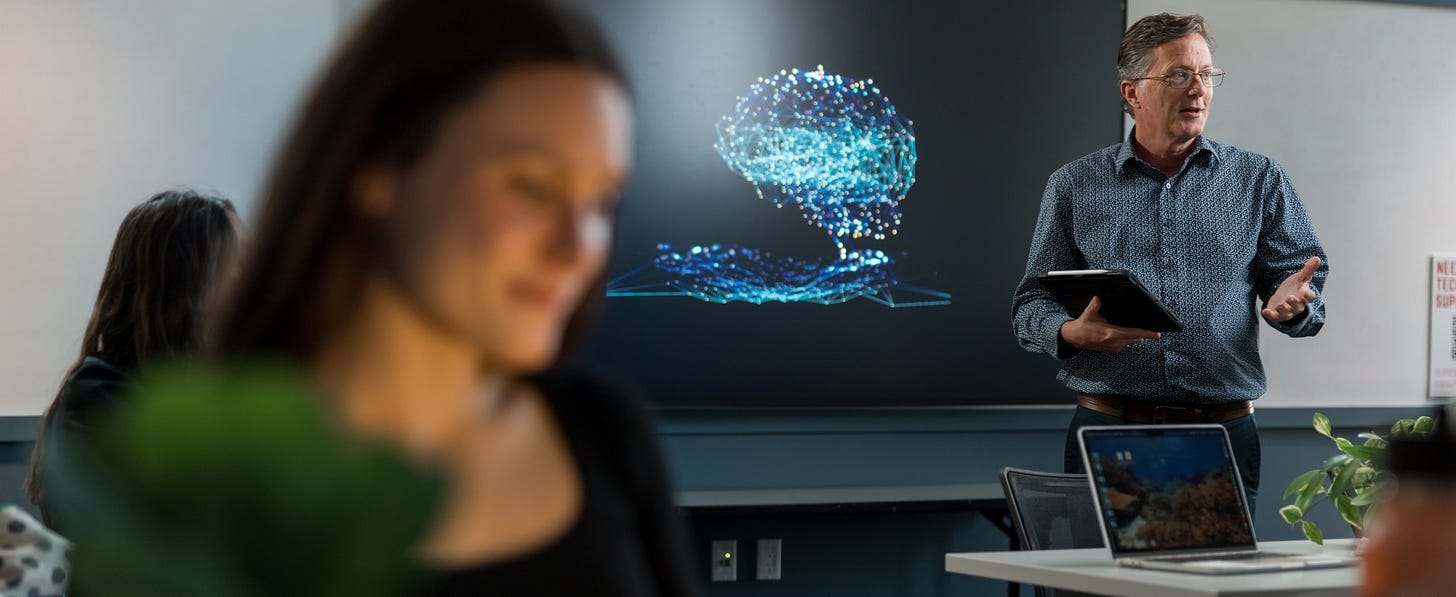First things first: what will you find in this newsletter
At least, this is what I am planning on writing about
Let’s think deeply about our use of technology together.
As we move into this “Age of AI,” it is more important than ever to take a critical look at our relationship with our digital tools and how they impact us both individually and as a culture. If you believe, as I do, that we are created in the image of God (Imago Dei), then you believe that human beings thrive when we are at our fullest capacity for loving God and loving each other. And that means taking a critical look at how we interact with the world, including through the use of technology. In this newsletter, we will look at the use of technology (with a focus on AI) through the lens of faith, with a special focus on its use in academic and faith environments.
Who I am.
My name is David Bourgeois and I have been working with digital technologies for my whole life. As a kid, I loved science fiction, from Star Trek reruns to Isaac Asimov’s Robots and Foundation series. These stories stoked my imagination about how technology would create an amazing future with space exploration and robot companions. I learned programming on a Commodore 64 in my living room one summer and went on to get degrees in Mathematics (BS), Management Science (MS), and Information Systems (PhD). Today, my love for technology (and reading science fiction) remains, but it is tempered with the reality of the impact that these technologies have had on me, my family, and our culture.
I am currently a Professor of Business Analytics and Artificial Intelligence in the Crowell School of Business at Biola University, where I have served since 2003. In 2024, I was appointed as the Director of the AI Lab at Biola. Before working at Biola, I served in a variety of roles as an information technology professional. You can find out more about me on my LinkedIn.
Thinking about unintended consequences.
This is not a newsletter that is anti-technology. To quote the apostle Paul: “May it never be!” I love learning about new technologies, exploring new ways that they can solve problems, and teaching about them to students. But we have lost our way; we have let the promise of an easier digital life replace the hard work and struggles that it takes to mature and grow as humans.
If we look to the past, we can see how new technologies can have unintended consequences. In 1985, Neil Postman published the seminal Amusing Ourselves to Death, which is just as relevant today as it was then. One of the book’s key points is that in the move from primarily a print-based society to a television-based society, we have begun to expect to be entertained, controlled by our love of amusement and distraction, sacrificing our capacity for rational thought and civic engagement. Sound familiar?
And the change has just intensified ever since. In 2010, Nicholas Carr wrote The Shallows: What the Internet Is Doing to Our Brains, highlighting how our attention spans were decreasing and our ability to think deeply was being curtailed. And in 2024, Jonathan Haidt gave a devastating report on the impact of smartphones and social media on the mental health of our children in The Anxious Generation.
When television, the Internet, social media, and the smartphone were first introduced, they were seen as signs of progress and a social good. I would argue that they still do bring good, but perhaps in some cases, the bad outweighs the good. And now we are face-to-face with an onslaught of new capabilities made possible through artificial intelligence. If we are to be at our fullest capacity for loving God and loving others, then we need to learn from these past experiences and figure out how to apply them so that we can use technology well.
Why should you subscribe to Imago Digerati?
Imago Digerati is a Christian community exploring how to be image-bearers of God in a technological age by championing our unique human dignity, creativity, and relational nature. The name represents the intersection of two ideas: “imago” is the first part of “Imago Dei”, the concept of human beings being created in the image of God; the term “digerati” means people with expertise or professional involvement in information technology.
With this as the context, I will present ideas, pose questions, and share my own research and experiences with you. I invite you to subscribe to this newsletter and join me as I ask questions and explore how faith intersects with our use of technology.


